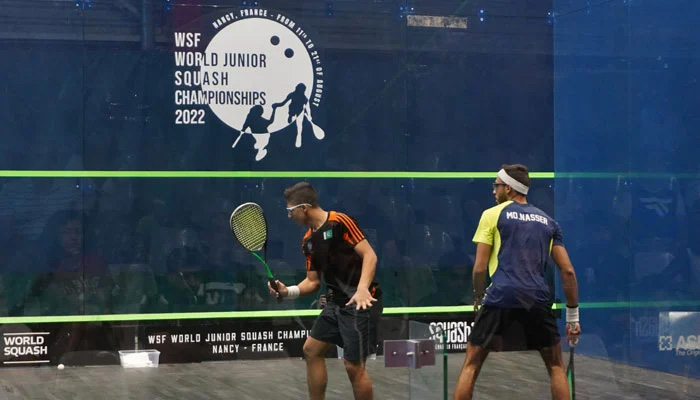What went wrong with Pak squash players in France?
For the first time in more than a decade, the duo – Hamza Khan and Noor Zaman – was carrying Pakistan’s hopes for that elusive title
It is generally believed that players ranked one and two are to make it to the final for the simple reasons that they are the best and favorites for the title irrespective of how important the event is. Same hopes emerged when two Pakistan juniors after a long time took the tag of No 1 and No 2 seed at the World Squash Individual Championship that kicked off in the second week of August in France.
For the first time in more than a decade, the duo – Hamza Khan and Noor Zaman – was carrying Pakistan’s hopes for that elusive title that eluded the country for 36 years now but what happened afterward was a bit disappointing, to say the least.
Noor lost earlier and Hamza looked far off from playing the game he usually is famous for. He was low in confidence and also was a bit tired and fatigued. His inability to put up a decent show in the semis and later again in the Team Championship semis where he was nowhere in the game was rather surprising.
Some clear slackness was visible from their approach, especially in the individual event.
Though Noor looked much-improved player in Team Championship, Hamza’s exhibition of stroke play went from bad to worse.
Some glaring weaknesses were there to be seen in Pakistan juniors’ display of squash when we compare it with the likes of other top players including the ultimate champion from Holland, the majority of English and Egyptian players. They were too brisk and up to the challenge in the majority of cases, unlike Hamza and Noor.
Both Pakistan players’ movement in the court was not up to the mark. Their reaction and movement were too slow to be called and rated as champion’s stuff. The two though have a bag full of talent and ability of stroke making, left wanting when it came to meeting the ball at the right place and angle.
To be more precise, because of the relatively heavier weight and slow reaction, Noor and Hamza’s reception of the ball was not up to the level that other leading juniors exhibited. You need to take the ball on your racket at the most appropriate time. Unnecessary stretching because of heavy footing resulted in poor display and hence the loss.
The other leading contenders especially those making it to the final were slimmer and fitter. Even their movement in the court was also exceptional. Despite having far fewer stroke-making resources, their lightweight and brisk movement made them the ultimate champions in both individual and Team events.
For a modern squash player, it is all about movement within the court-the lesser in weight the better the reaction is the rule followed in modern squash. Three years back in an interview with ‘The News’ Marvin Shorbagy the then world No 1 blamed Pakistanis for playing slow squash which he said would take them nowhere. What he exactly meant was that Pakistanis are not realising the requirements of modern-day squash which is to get extremely fit to meet the ball properly wherever it goes within the court.
The coach-less Pakistan team though had a trainer accompanying the team to France, there is a dire need for a professional coach.
The Pakistan Squash Federation must hire a true professional who knows the requirements of modern-day squash. A revolution in the physical fitness of players is required where besides other things there should be a serious check on players’ food consumption in a special context to their weight reduction.
-
 Woman Calls Press ‘vultures’ Outside Nancy Guthrie’s Home After Tense Standoff
Woman Calls Press ‘vultures’ Outside Nancy Guthrie’s Home After Tense Standoff -
 Allison Holker Gets Engaged To Adam Edmunds After Two Years Of Dating
Allison Holker Gets Engaged To Adam Edmunds After Two Years Of Dating -
 Prince William Prioritises Monarchy’s Future Over Family Ties In Andrew Crisis
Prince William Prioritises Monarchy’s Future Over Family Ties In Andrew Crisis -
 Timothée Chalamet Turns Head On The 'show With Good Lighting'
Timothée Chalamet Turns Head On The 'show With Good Lighting' -
 Bucks Vs Thunder: Nikola Topic Makes NBA Debut As Milwaukee Wins Big
Bucks Vs Thunder: Nikola Topic Makes NBA Debut As Milwaukee Wins Big -
 King Charles Breaks 'never Complain, Never Explain' Rule Over Andrew's £12 Million Problem
King Charles Breaks 'never Complain, Never Explain' Rule Over Andrew's £12 Million Problem -
 Casey Wasserman To Remain LA Olympics Chair Despite Ghislaine Maxwell Ties
Casey Wasserman To Remain LA Olympics Chair Despite Ghislaine Maxwell Ties -
 Shaun White Is Back At The Olympics But Not Competing: Here’s Why
Shaun White Is Back At The Olympics But Not Competing: Here’s Why -
 Breezy Johnson Engaged At Olympics After Emotional Finish Line Proposal
Breezy Johnson Engaged At Olympics After Emotional Finish Line Proposal -
 King Charles Wants Andrew To 'draw A Line' Under Epstein Issue
King Charles Wants Andrew To 'draw A Line' Under Epstein Issue -
 John Wick Game Confirmed With Keanu Reeves And Lionsgate Collaboration
John Wick Game Confirmed With Keanu Reeves And Lionsgate Collaboration -
 Gigi Hadid Feels 'humiliated' After Zayn Malik's 'pathetic' Comment: Source
Gigi Hadid Feels 'humiliated' After Zayn Malik's 'pathetic' Comment: Source -
 Olympics Men Hockey Game: McDavid, Crosby Power Canada Past Czechia
Olympics Men Hockey Game: McDavid, Crosby Power Canada Past Czechia -
 Sony PlayStation State Of Play Reveals 'Castlevania' And 'Metal Gear' Return
Sony PlayStation State Of Play Reveals 'Castlevania' And 'Metal Gear' Return -
 Ontario Tuition Freeze Ends, Allowing Colleges And Universities To Raise Fees
Ontario Tuition Freeze Ends, Allowing Colleges And Universities To Raise Fees -
 King Charles Should Apologise To All Rape Victims, Says New Poll
King Charles Should Apologise To All Rape Victims, Says New Poll




